Writing about film sounds fun until the first draft looms. Many college students stare at the blank page, unsure how to write a movie review that meets academic standards and still captures personal reaction. In the rush to beat the deadline, they open tabs for plot summaries, critic blogs, and style guides, yet clarity stays out of reach. That’s where a trusted helper, like write my paper for me, enters the picture. A professional writer can walk students through each step, from choosing a focus to polishing the final line, and teach skills that last beyond one assignment. This article explores how writing services boost confidence, sharpen analysis, and save time while keeping the voice of the student intact. By the end, readers will understand the key parts of an insightful review, discover handy tools such as a movie review template, and see exactly how expert support turns a late-night struggle into a clear, well-argued paper.
The Challenge of Writing Movie Reviews in College
College courses often treat film reviews as easy warm-ups, yet students soon notice they are juggling many demands at once. A professor expects clean grammar, thoughtful critique, reference to cinematic techniques, and proper citation, all inside a tight word limit. Add teamwork, part-time jobs, and other essays, and the assignment grows stressful. Unlike a casual social-media post, an academic review must weave plot summary with interpretation, avoid spoilers, and link observations to course themes. Many learners also worry that their personal taste is not “scholarly” enough to earn top marks. Because movies blend sound, image, and performance, describing them requires vivid language that still feels objective. First-year students may not yet know terms like diegetic sound or non-linear editing, but they are expected to use them fluently. All these hurdles can freeze progress, leading to late submissions or shallow commentary. Recognizing these challenges is the first step toward seeking tools and guidance that make the process less overwhelming.
What Makes Students Use Expert Writing Services?
Many students determine that a little professional assistance is worthwhile when they have a lot of deadlines to meet. Professional writing services provide a road map that demystifies the process in addition to a completed paper. The assigned writer usually includes an outline, annotated sources, and stylistic notes explaining each decision when a student orders a draft. These extras end up helping you study for upcoming tasks. Academic integrity is protected by privacy policies and plagiarism checks, which let students submit original work while still using the model as a guide. Saving time is also important. Students can spend an hour reviewing a prepared example and then revising it to fit their own voice and the requirements of the classroom, saving them from having to spend four evenings struggling with structure. Having access to native editors helps foreign learners get used to English language standards by explaining grammatical rules that are often overlooked in textbooks. Services are available at short notice due to their round-the-clock operations, which transform last-minute anxiety into gradual guided progress.
Knowing the Fundamentals of Writing a Movie Review
The first step in writing a movie review is to divide the work into manageable chunks. The hook, a sentence that draws the reader in without giving away the conclusion, comes first. The plot is then succinctly summarized along with the director and key characters. This part should provide sufficient background for analysis without giving away too much. The author moves on to the evaluation after the summary. This discussion of acting, sound design, cinematography, and script structure demonstrates critical depth. Using specific scenes to back up each assertion demonstrates attentive viewing. The film is also linked to broader themes by a good reviewer, such as genre norms, cultural issues, or the director’s prior work. The final section summarizes key points and determines whether the film is worth seeing. The tone of the paper should remain balanced, avoiding both harsh dismissal and fan club cheerleading. Evidence is what persuades, not feelings. The reader can follow the argument with ease and have faith in the reviewer’s judgment when these components are presented in a logical order.
Utilizing a Template for Movie Reviews to Maintain Order
By acting as a checklist, a movie review template helps you avoid hours of guesswork. There are pre-made headings like Introduction, Plot Overview, Technical Analysis, and Personal Reflection that students can fill in rather than staring at an empty screen. This structure avoids unintentional repetition and maintains ideas in the proper order. Additionally, templates serve as a reminder to authors to include a thesis statement at the beginning, list cast and crew information, and cite examples. While some instructors supply their own outlines, many writing services include a customizable template with every order. Students preserve their academic rigor and creativity by modifying the sections to fit the assignment requirements. Pacing is another benefit; filling out one box at a time lessens the temptation to make changes in the middle of the draft, which frequently halts development. The template also serves as a revision map following the initial draft. Students can determine whether a paragraph needs to be trimmed or if it serves its purpose. In summary, an intelligent layout simplifies difficult analysis into digestible chunks.
Successful Academic Performance: Mastering the Review Format
Even the most insightful comments may lose points if the review format is not up to departmental standards. Colleges usually follow the MLA, APA, or Chicago styles for citations, margins, and heading placement. Double-spaced text, numbered pages, and a clear title page give the document a polished appearance and make it easier for instructors to provide feedback. Similarly, formatting applies to in-text references. Depending on the rule chosen, page or time stamps are required when quoting dialogue or describing a camera movement. Current style guides are kept on hand by writing services to ensure that every italicized title and comma is positioned appropriately. Beyond citation, consistent paragraph indentation and font choice improve readability, which indirectly affects grade. A well-structured early education program helps students avoid last-minute rushed fixes that are prone to errors. Comparing requirements to a grading rubric prior to writing will help you write with less stress later. A reviewer maintains academic standards and gives each finding validity by treating structure with the same attention as content.
Writing a Critical Voice That Is Balanced
A balanced critical voice must be developed by recognizing strengths and fairly addressing weaknesses. Many students gravitate toward extremes—either intense acclaim or harsh criticism—because they lack a framework for objective analysis. Writing services use neutral language, such as the pacing slows down in the second act, rather than calling the middle dull. Subjective opinion is less important in this approach than actual data. Adding a compliment to every critique is an additional strategy. For instance, after discussing shallow character arcs, the author might highlight imaginative set design or a memorable soundtrack. This balance not only reflects professional critique but also keeps the reader interested. Maintaining tone consistency is also crucial because the audience gets confused when you go from informal slang to formal jargon. Film terminology glossaries are often offered by services to help writers convey their ideas clearly and concisely without coming across as pretentious. Students eventually internalize these patterns, producing reviews that appear authoritative, thoughtful, and respectful—qualities that teachers appreciate and give higher grades for.
How a Writing Service for Movie Reviews Improves Education
A professional movie review writing service functions as a one-on-one tutor in addition to creating excellent paragraphs. When a student receives a draft, the comments section explains how the passive voice reduces urgency or how specific adjectives enhance imagery. Because of these annotations, the document becomes a live instruction. To encourage ethical research practices, a lot of platforms also provide plagiarism reports and source lists. Students can ask follow-up questions about structure, tone, or citation style using interactive features like direct chat with the assigned writer. A visit during business hours is comparable to this immediate feedback loop, but there are no scheduling conflicts. Students reinforce what they learn in class by looking at good examples and then applying the techniques in recent films. As their independent reviews improve over time, the need for outside help diminishes. When everything is taken into account, a movie review writing service expedites the learning process and gives students the skills and information they need to manage future assignments independently. This type of empowerment helps with both coursework and future employment. Avoid these common mistakes. Even with meticulous preparation, some pitfalls can compromise a well-meaning review. The most frequent error is to turn the paper into a comprehensive plot synopsis. Professors prefer analysis to a scene-by-scene outline. Another error is to use general terms like great or bad without giving any context. Specificity persuades when uncertainty is present.
Additionally, students sometimes overlook technical details, focusing only on the storyline and ignoring sound design, lighting, or editing. It can also be risky to use first-person pronouns excessively. A statement that is more objective than I felt tense is that the viewer feels tense as the camera zooms in. Citation mistakes receive a high rating on grading rubrics, so double-check all of your sources and time stamps.
Finally, avoid writing at the last minute when there isn’t time for proofreading. Automated spellcheck fails to detect typos, but a leisurely review session does. A paper can be elevated from mediocre to exceptional by avoiding these common mistakes. Using the knowledge gained from writing services, these errors can be found before they get to the professor’s desk.
From Draft to Final Submission: Useful Advice for Students
Theory knowledge is useful, but action is what makes the difference. Using the following checklist, students can write film reviews more effectively. See the film twice, once for pleasure and once for your notes. Write down your initial thoughts on the acting, sound plot, and visuals right away. Before writing complete sentences, group observations under the headings from your template. Write a thesis statement that responds to the query What makes this film succeed or fall short?. At least one scene example and, if necessary, academic references should be used to bolster each assertion. Verify that the format of the review adheres to the syllabus style guide. To avoid inadvertent spoilers or awkward wording, read the draft aloud. To guarantee originality, use service-provided reports or free plagiarism detectors. To ensure clarity, let a friend or tutor proofread. With confidence, submit. Students turn disorganized ideas into a cohesive argument by following these steps. Writing an effective movie review can be as engaging as watching the film itself, with practice and occasional professional advice, even though the process may seem drawn out at first.







